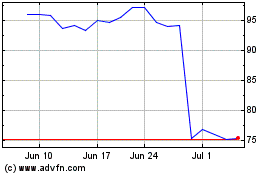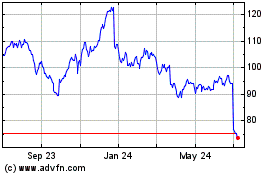Appetite for Blue-Chip Corporate Bonds Improves Amid Continued Credit-Market Stress
March 25 2020 - 3:05PM
Dow Jones News
By Sam Goldfarb
Blue-chip U.S. companies are having an easier time issuing new
bonds, a sign of improving conditions in some parts of the credit
markets after a series of extraordinary Federal Reserve
interventions.
Business giants including Nike Inc., McDonald's Corp. and Pfizer
Inc. were among those poised to sell bonds Wednesday, following in
the footsteps of Comcast Corp. and Mastercard Inc. a day earlier.
In a sign of increased demand among investors, the companies were
set to issue the bonds at significantly lower yields than their
initial offers at the start of the day.
Even though companies sold a large amount of investment-grade
bonds last week, they were forced to pay such high interest rates
that it only added to concerns about a breakdown in credit markets,
as investors reeled in response to the spread of the coronavirus
and the aggressive measures taken by public authorities to contain
it. Corporate bond sales had all but ground to a halt earlier in
the month, underscoring how the virus was threatening businesses by
disrupting financial activity.
Improvement in the investment-grade corporate bond market
follows the announcement by the Fed on Monday that it would buy
unlimited amounts of government debt and create new facilities to
buy new and existing corporate bonds that carry investment-grade
ratings.
"With the backstop from the Fed, I think it helps meaningfully,"
said Gene Tannuzzo, deputy global head of fixed income at Columbia
Threadneedle.
Nike on Wednesday was set to sell $1.5 billion of 10-year notes
at yield 2 percentage points above comparable U.S. Treasurys, down
from initial guidance of a 2.5 percentage point spread. McDonald's
was poised to sell $1 billion of 10-year notes at a 2.85 percentage
point spread, down from initial guidance of 3.35 percentage
points.
In recent trading, the yield on the benchmark 10-year U.S.
Treasury note was 0.805%, according to Tradeweb, compared with
0.813% Tuesday. Yields fall when bond prices rise.
In another sign of a healthier market, companies on Tuesday sold
their new investment-grade bonds at an average spread that was just
0.037 percentage point above the spreads on their existing bonds,
according to BofA Global Research. That was down from 0.37
percentage point Monday and roughly 0.5 to 0.8 percentage point
last week.
The cost of protecting corporate bonds against default using
credit derivative indexes has also declined this week. It cost
$105,300 a year to protect $10 million of U.S. investment-grade
bonds against default for five years on IHS Markit's CDX index,
down marginally from Tuesday's close and significantly lower than
Friday's $151,000.
Signs of severe stress in credit markets remain, however.
As of Tuesday, the average investment-grade corporate-bond
spread was 3.53 percentage points, up from 1.07 percentage points a
month ago, according to Bloomberg Barclays data. Fifty-seven
percent of speculative-grade corporate loans are now priced below
80 cents on the dollar, compared with just 4% at the end of last
year, according to LCD, a unit of S&P Global Market
Intelligence.
Write to Sam Goldfarb at sam.goldfarb@wsj.com
(END) Dow Jones Newswires
March 25, 2020 14:50 ET (18:50 GMT)
Copyright (c) 2020 Dow Jones & Company, Inc.
Nike (NYSE:NKE)
Historical Stock Chart
From Mar 2024 to Apr 2024

Nike (NYSE:NKE)
Historical Stock Chart
From Apr 2023 to Apr 2024
